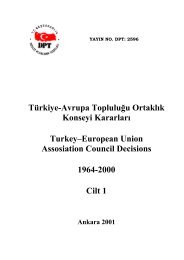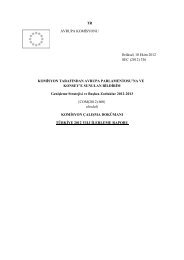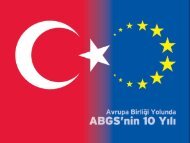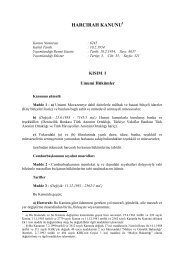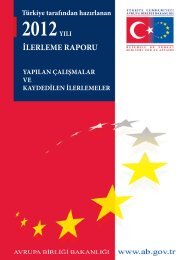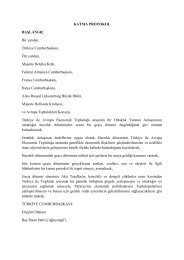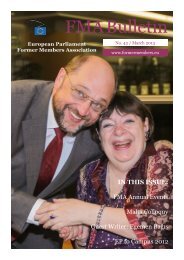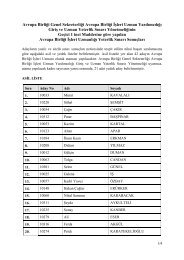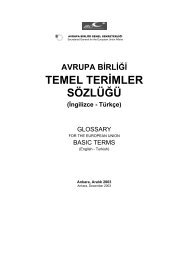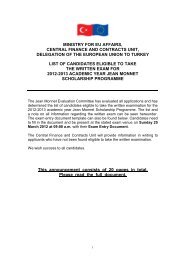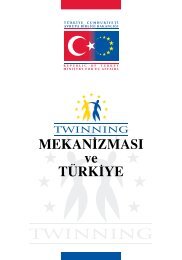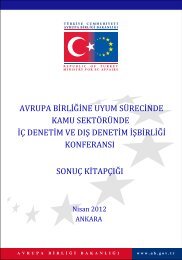2010 ilerleme raporu - Avrupa BirliÄi BakanlıÄı
2010 ilerleme raporu - Avrupa BirliÄi BakanlıÄı
2010 ilerleme raporu - Avrupa BirliÄi BakanlıÄı
Create successful ePaper yourself
Turn your PDF publications into a flip-book with our unique Google optimized e-Paper software.
multi-ethnic, multi-cultural and multi-religious nature of the region. The Turkish President<br />
visited Bosnia and Herzegovina in September.<br />
In addition, high-level bilateral meetings were conducted with Albania, the former Yugoslav<br />
Republic of Macedonia, Kosovo 33 , Montenegro and Serbia. The Turkish Prime Minister<br />
visited Serbia in July <strong>2010</strong>. The Serbia-Turkey free trade agreement came into force in<br />
September <strong>2010</strong>.<br />
On 20 November, an agreement was signed to lift visa requirements for Albanian citizens<br />
travelling to Turkey.<br />
Relations with Bulgaria remained positive.<br />
As regards the International Criminal Court (ICC), see Chapter 31 – Common foreign and<br />
security policy.<br />
3. ECONOMIC CRITERIA<br />
In examining the economic developments in Turkey, the Commission’s approach was guided<br />
by the conclusions of the European Council in Copenhagen in June 1993, which stated that<br />
membership of the Union requires the existence of a functioning market economy and the<br />
capacity to cope with competitive pressure and market forces within the Union.<br />
3.1. The existence of a functioning market economy<br />
Economic policy essentials<br />
The Pre-Accession Economic Programme (PEP) submitted to the Commission in January<br />
<strong>2010</strong> adequately reflects needs and commitments to further reform. It draws largely on the<br />
Medium-Term Plan (MTP) published in mid-2009. The government’s new MTP, due by<br />
October <strong>2010</strong>, should focus on the recovery conditions. The authorities largely adhered to the<br />
economic policy principles as reflected in the International Monetary Fund’s (IMF) Article IV<br />
report. The fragmentation of responsibilities between government bodies, however, continues<br />
to complicate coordination of budgeting and medium-term economic policy-making. Another<br />
challenge that Turkey is facing is to lock in its future economic success and stability in a<br />
consistent and comprehensive framework aimed at broader-based productivity growth and<br />
higher labour market participation. Strong inflationary pressures and a rapidly growing<br />
current account deficit have to be carefully monitored and addressed properly. Overall,<br />
consensus on economic policy essentials has been preserved. However, confidence in the<br />
government’s economic policy stance would benefit from better planning, coordination and<br />
communication.<br />
Macroeconomic stability<br />
GDP contracted by about 5% in 2009, a sharp contrast to the 6% average annual growth rate<br />
in the period 2004-08 and the growth of 0.7% in 2008. Turkey's GDP per inhabitant stands at<br />
46% of the EU average. The global financial crisis hit the economy hard dramatically<br />
reducing fixed investment and external demand. Fiscal and monetary stimulus measures,<br />
combined with a healthy banking sector, helped cushion the blow. After a severe contraction<br />
33<br />
Under UNSCR 1244/1999.<br />
EN 38 EN




